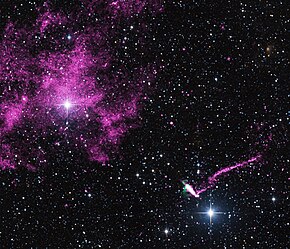G290.1-0.8
Appearance
| Nebula | |
|---|---|
 Composite image of IGR J11014-6103 and MSH 11-61A that contains data from NASA's Chandra X-ray Observatory (purple), radio data from the Australia Compact Telescope Array (green), and optical data from the 2MASS survey (red, green, and blue) | |
| Observation data: J2000 epoch | |
| Right ascension | 10h 59m 25.36s[1] |
| Declination | −61° 18′ 42.6″[1] |
| Constellation | Carina |
| Notable features | Possible undiscovered neutron star and two bright spots |
G290.1-0.8 (also known as MSH 11-61A[2]) is a supernova remnant in the constellation Carina.[3] It is located in the Galactic plane of the galaxy in the Carina arm.[4]
The supernova remnant has two bright spots opposite symmetric to each other on a symmetry axis running towards north west-south east direction. Theses bright spots are not homogeneous to the rest of the supernova remnant and had not reached ionization equilibrium yet.
This suggests that there might be a neutron star that has not been discovered yet. The rest of the supernova remnant originated from a high mass star that went supernova with a possible strong bipolar wind.
References
[edit]- ^ a b "NAME MSH 11-61A". SIMBAD. Centre de données astronomiques de Strasbourg. Retrieved 2024-10-26.
- ^ Auchettl, Katie; Slane, Patrick; Castro, Daniel; Foster, Adam R.; Smith, Randall K. (August 27, 2015). "Multi-wavelength analysis of the galactic supernova remnant MSH 11-61A". The Astrophysical Journal. 810 (1): 43. arXiv:1507.08012. Bibcode:2015ApJ...810...43A. doi:10.1088/0004-637X/810/1/43. hdl:1721.1/99908. ISSN 1538-4357. S2CID 28209347.
- ^ Reynoso, Estela M.; Johnston, Simon; Green, Anne J.; Koribalski, Bärbel S. (2006-06-01). "High-resolution HI and radio continuum observations of the SNR G290.1-0.8". Monthly Notices of the Royal Astronomical Society. 369 (1): 416–424. arXiv:astro-ph/0603533. Bibcode:2006MNRAS.369..416R. doi:10.1111/j.1365-2966.2006.10325.x. hdl:11336/21020. ISSN 0035-8711. S2CID 9215987.
- ^ Petre, Robert; Hughes, John P.; Smith, Randall K.; Slane, Patrick (January 1, 2002). "An X-Ray Study of the Supernova Remnant G290.1-0.8". The Astrophysical Journal. 564 (564): 284–290. arXiv:astro-ph/0108473. Bibcode:2002ApJ...564..284S. doi:10.1086/324155. S2CID 119506523.

